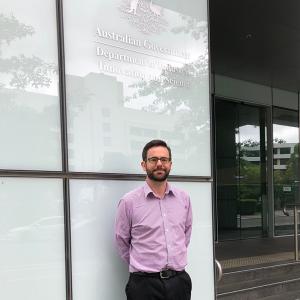Bryant, 2018–19
Bryant
What were you researching before you started as a Science Policy Fellow?
My research evaluated the stress effects of aquatic pollution on freshwater invertebrates. Unfortunately, rivers and wetlands are commonly subject to chemical pollution. My work investigated insect stress responses to chronic pollution exposure. These responses can act as the “canary in the mine”, to help diagnose which ecosystems are at risk.
What policy area are you working on through the Science Policy Fellowship Program?
Our work in the Department of Industry, Innovation and Science, specifically the Science and Commercialisation Policy Division, is focused on improving innovation, science commercialisation and collaboration outcomes across the Australian business and research sectors. I therefore get to work in a variety of specific policy areas, including entrepreneurship, commercialisation and intellectual property. It’s varied and interesting work.
How has your research background helped you contribute to policy development?
Many skills from my PhD have helped me here. Quickly assimilating new knowledge for one. As a biologist for example, I’ve had to learn many economic terms and principles! Fortunately, I’ve also found some crossover with my statistical skills. Project management, clear writing, and problem-solving skills have also helped.
How has the program changed your career aspirations?
Policy was one of several career directions I was considering. Now that I’ve had hands-on experience, I hope to continue in this direction! The Fellowship has provided a great starting point: a good balance between having my existing skills valued, and being up-skilled in new areas. I’ve found the experience intellectually challenging and rewarding.
What is your favourite part about working in a policy role in the Australian Public Service?
A sense of having impact. Academia is really fun: you can publish results internationally and, all going well, potentially drive incremental change. Policy work in some ways feels more direct though. Here, I can work in a team whose output goes directly to our political leaders. It feels quite satisfying.

